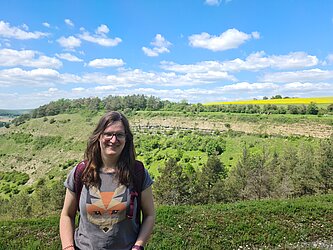Ariane Droin

Lehrstuhl für Fernerkundung
![]() +49 (0)931 31-88607
+49 (0)931 31-88607
ariane.droin@uni-wuerzburg.de
Institut für Geographie und Geologie
Lehrstuhl für Fernerkundung
John Skilton Str. 4a
97074 Würzburg
nach Vereinbarung
2025[ to top ]
-
. (2025): Sensing the Environment Using a Cargo Bike. In: 2025 Joint Urban Remote Sensing Event (JURSE), 1-4.
-
. (2025): Spatial Accessibility in Transition: Evaluating Urban Growth and Service Distribution in Westhoek, Belgium. In: 2025 Joint Urban Remote Sensing Event (JURSE), 1-4.
-
. (2025): Assessing the x-minuteness for different urban structural types in Berlin, Germany. In: 2025 Joint Urban Remote Sensing Event (JURSE), 1-4.
-
. (2025): Pixels, chisels and contours - technical variations in European road traffic noise exposure maps. In: Journal of Environmental Management, 385, 125475.
2024[ to top ]
-
. (2024): How does pedestrian permeability vary in and across cities? A fine-grained assessment for all large cities in Germany. In: Computers, Environment and Urban Systems, 110, 102115.
-
. (2024): Liveability in large housing estates in Germany – Identifying differences based on a novel concept for a walkable city. In: Landscape and Urban Planning, 251
2023[ to top ]
-
. (2023): In the tension between large-scale analysis and accuracy - Identifying and analysing intra-urban (sub-)centre structures comparing official 3D-building models and TanDEM-X nDSMs. In: Computers, Environment and Urban Systems, 102, 101953.
-
. (2023): Quantifying urban heat exposure at fine scale - modeling outdoor and indoor temperatures using citizen science and VHR remote sensing. In: Urban Climate, 49, 101522.
-
. (2023): Are public green spaces distributed fairly? A nationwide analysis based on remote sensing, OpenStreetMap and census data. In: Geocarto International, 38 (1)
-
. (2023): Greener cities cost more green: Examining the impacts of different urban expansion patterns on NPP. In: Building and Environment, 228
-
. (2023): The Individual Walkable Neighborhood - Evaluating people-centered spatial units focusing on urban density. In: Computers, Environment and Urban Systems, 99
2022[ to top ]
-
. (2022): Morphometrische Ableitung von Fließfacetten anhand von hochauflösenden Structure from Motion (SfM) Geländemodellen. In: Die Höhle, 73 (1-4)
-
. (2022): To be, or not to be ‘urban’? A multi-modal method for the differentiated measurement of the degree of urbanization. In: Computers, Environment and Urban Systems, 95, 101830.
2021[ to top ]
-
. (2021): Spatial factors influencing building age prediction and implications for urban residential energy modelling. In: Computers, Environment and Urban Systems, 88
-
. (2021): Deep Learning-Based Generation of Building Stock Data from Remote Sensing for Urban Heat Demand Modeling. In: ISPRS Journal of Photogrammetry and Remote Sensing, 10 (23), 1-20.
2025[ to top ]
-
. (2025): Sensing the Environment Using a Cargo Bike. In: 2025 Joint Urban Remote Sensing Event (JURSE), 1-4.
-
. (2025): Spatial Accessibility in Transition: Evaluating Urban Growth and Service Distribution in Westhoek, Belgium. In: 2025 Joint Urban Remote Sensing Event (JURSE), 1-4.
-
. (2025): Assessing the x-minuteness for different urban structural types in Berlin, Germany. In: 2025 Joint Urban Remote Sensing Event (JURSE), 1-4.
2021[ to top ]
-
. (2021): Collecting data for urban building energy modelling by remote sensing and machine learning. In: Proceedings of Building Simulation 2021: 17th Conference of IBPSABuilding Simulation, 1139-46.



